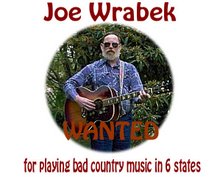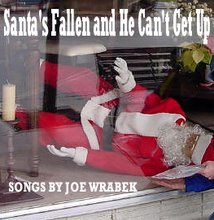WELCOME...
This blog is the outgrowth of a songwriting workshop I conducted at the 2006 "Moograss" Bluegrass Festival in Tillamook, Oregon. It presumes that after 30-odd years of writing and playing music, I might have something to contribute that others might take advantage of. If not, it may be at least a record of an entertaining journey, and a list of mistakes others may be able to avoid repeating.
This blog is intended to be updated weekly. In addition to discussions about WRITING, it will discuss PROMOTION--perhaps the biggest challenge for a writer today--as well as provide UPDATES on continuing PROJECTS, dates and venues for CONCERTS as they happen, how and where to get THE LATEST CD, the LINKS to sites where LATEST SONGS are posted, and a way to E-MAIL ME if you've a mind to.
Not all these features will show up right away. Like songwriting itself, this is a work in progress. What isn't here now will be here eventually. Thank you for your interest and your support.
Tuesday, May 29, 2012
SOMEBODY'S RULES FOR LYRIC WRITING...
I ran across another “rules for writing” article. I’m always interested in those: I want to know if I’m “doing it right”—but I also tend to critique what they’re saying. So many of the rule-propounders claim, “Do what I do, and you’ll be a success” and this one was no exception. The rules in this case were for writing LYRICS, which is of particular interest to me since words is what I do. Because I have a limited voice range, am not particularly good on the guitar and am still mostly tone-deaf, I consider the music simply a delivery mechanism for the words.
Here’s the rules:
1. Come up with a great title. People often say my titles are good. I think that’s an argument for letting the audience tell you what the title is. I rarely identify a song by title—I want to see what other people call it when they request it. And they’ve come up with some good titles.
2. Be specific. Particularly applicable to country music, which is what I write. No matter how high-falutin’ the message, it’s got to be expressed in terms of real (though not necessarily believable) things happening to real people.
3. It’s the music, stupid. Good melodies, in other words. I think I end up being distinctive because I insist every song sound different.
4. Writing is re-writing. Yes, but I’ll do most of my re-writing before I ever write anything down. I also insist on outside input—one shouldn’t write in a vacuum. (Poor lighting in a vacuum.)
5. What you say counts. They’re saying “be different” and I agree. Be saying either something new or something old in a new way. That’s where the dead animals come in. If you’re expressing it in terms of roadkill you are probably saying something different.
6. Step away from your piano or guitar. I never pick up the guitar until after I have the lyrics and melody all worked out. Most of my writing takes place in situations where I not only can’t use a guitar, I can’t even use a pen—so I have to memorize everything.
7. A song is not a poem. Sometimes it is. I’ve set Edgar Allen Poe and Dr. Seuss (and lesser-known poets, too) to music. “Oral tradition” stuff—poetry meant to be performed, not read—can be musicated easily because it has a beat, rhymes frequently, and has repeating parts.
8. Your lyrics must sing. “Poesy,” in other words. I regularly adjust lyrics so they’ll “sing good.” Doesn’t mean melodies have to be appropriate to the lyrics—sometimes dissonance is good. I like my songs about death to be upbeat and happy-sounding, for example.
9. Need I repeat—repetition works. Because modern pop music does it? Lots of repetition is not necessary to get people to remember a song. In “When I Jump Off the Cliff I’ll Think of You,” the hook occurs only four times in nine chorus-less verses. It’s still memorable.
10. Know your genre. I have done that. Nashville particularly is rife with rules about how you’re supposed to write, and I mostly ignore them (just like most successful writers of country music do). I do follow a mantra I learned from a newspaper editor I worked for: “You have to know the rules before you can break them effectively.”
So… I’m doing all that (mostly—with a couple exceptions those are good rules), but the music industry still has not beat a path to my door (and realistically is unlikely to). “Do this and you’ll be successful” probably isn’t true. Promotion and name familiarity enters into the picture a lot, too, I think—and I’m still far from being a household word. (“Toilet paper” is more of a household word than I am.) The above rules may make one a better writer but they do not make you a more famous one.
Joe
Subscribe to:
Post Comments (Atom)



No comments:
Post a Comment